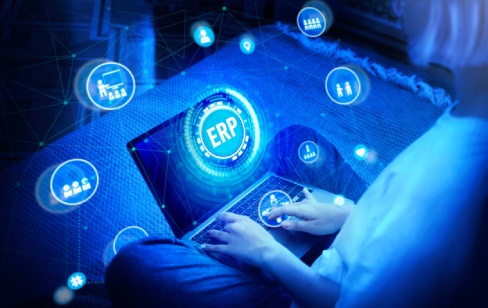-
Over the years, Enterprise Resource Planning (ERP) systems have played a crucial role in optimizing business processes and centralizing data from different departments. Despite their benefits, traditional ERP systems encounter obstacles concerning data security, integrity, and transparency. To address these issues, blockchain development services promise to elevate ERP capabilities. In this comprehensive blog, we will delve into the world of Blockchain-based ERP, exploring its potential to revolutionize business efficiency and transparency, leading to a more secure and streamlined business ecosystem.
Understanding Blockchain-based ERP
The emerging concept represents a fusion of traditional ERP systems with the transformative power of blockchain technology, creating a robust and transparent data management platform. By harnessing blockchain's inherent characteristics, including immutability, smart contracts, and consensus mechanisms, businesses can elevate data sharing, enhance traceability, and automate processes, ushering in a new era of efficiency and reliability.
Advantages
Enhanced Data Security
The integration of blockchain ensures robust data security through cryptographic encryption, safeguarding information from unauthorized access and tampering. As data is distributed across the network, the risk of cyberattacks is significantly reduced due to the absence of a single point of failure.
Immutable Data Records
Blockchain's immutability feature guarantees that once data is recorded, it remains unalterable and cannot be deleted. This creates an auditable and tamper-proof trail of all transactions, ensuring data integrity and minimizing the possibility of fraudulent activities.
Explore More | NFT Loyalty Program: The Ultimate Guide for Enterprises
Improved Transparency and Traceability
Blockchain-based ERP solutions enable real-time tracking of goods and services, providing enhanced transparency and traceability throughout the supply chain. Businesses and stakeholders can easily verify the origin and movement of products, fostering trust among customers and partners.
Streamlined Inter-Company Transactions
By leveraging blockchain-based smart contracts, inter-company transactions can be automated and executed automatically based on predefined conditions. The elimination of intermediaries streamlines processes, reduces delays, and lowers transaction costs, leading to more efficient and cost-effective transactions.
Decentralized Data Management
The decentralized nature of blockchain technology eliminates the need for a central authority to manage data. This reduces dependency on a single entity and promotes a distributed decision-making process, enhancing the efficiency and resilience of the ERP system.
Also, Visit | Adoption Value of Smart Contracts for Enterprises
Applications
Supply Chain Management
Blockchain-based ERP systems offer transformative solutions for supply chain management by enabling end-to-end traceability of products. Businesses can monitor every stage of the supply chain, from raw material sourcing to final product delivery, ensuring transparency, authenticity, and quality control.
Product Lifecycle Management (PLM)
Industries, especially manufacturing, can benefit from Blockchain-based ERP for efficient product lifecycle management. The blockchain records all stages of a product's development, providing stakeholders with real-time access to data for informed decision-making and streamlined collaboration.
Finance and Accounting
Blockchain-based ERP simplifies financial operations by automating tasks such as invoice processing, payments, and auditing. Smart contracts enable automatic settlement of financial transactions, reducing delays and the potential for human errors in financial management.
You May Also Like | Enterprise-Grade NFT Solutions | Moving Beyond the Hype
Human Resources Management
In the realm of HR management, Blockchain-based ERP improves efficiency in processes such as recruitment, employee onboarding, and payroll management. The secure storage of employee records on the blockchain ensures data privacy and enhances protection against data breaches.
Challenges and Considerations
Scalability
One of the primary challenges for blockchain-based ERP systems is scalability, especially when dealing with a large volume of transactions. However, ongoing advancements in blockchain protocols and the implementation of layer-two solutions are actively addressing this concern, paving the way for more scalable ERP solutions.
Integration with Existing Systems
The integration of blockchain-based ERP with existing legacy systems can be a complex task. Businesses must ensure seamless compatibility and data migration during the implementation process to avoid disruptions in operations and ensure a smooth transition.
Also, Check | Best Hyperledger Projects for Enterprise Blockchain Solutions
Regulatory Compliance
Businesses operating in different industries and geographical locations must adhere to specific regulations and data privacy laws. Blockchain-based ERP systems must be designed and implemented in a way that complies with these regulations to ensure legal operations and data management practices. This may involve incorporating features like data access controls and permissioned access to align with regulatory requirements.
Conclusion
Blockchain-based ERP marks a revolutionary transformation in the management of business data and operations. With the utilization of blockchain's inherent traits, such as transparency, security, and immutability, businesses can attain heightened efficiency, enhanced traceability, and seamless automation. Embracing blockchain-based ERP opens up a realm of possibilities across various domains, including supply chain management, finance, and HR, empowering businesses to optimize processes and gain a decisive competitive advantage. However, getting started with the convergence of these two technology requires expert consultation. Connect with our blockchain experts to bring your idea to realization.

Our Offices
INDIA
Emaar Digital Greens, Sector 61,
Gurugram, Haryana
122011.
Welldone Tech Park,
Sector 48, Sohna road,
Gurugram, Haryana
122018.













